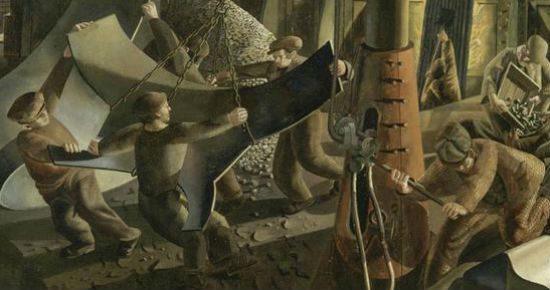“Reject the dark side. Follow the light,” Charles C. Camosy writes for Religion News Service. He’s writing about Rogue One, the new Star Wars movie, which he fears shades too much toward a kind of “gray moral relativism.” Dunno, haven’t seen it yet.
Camosy’s earnest plea for moral clarity even in an uncertain, morally complex universe includes a reference to the prominent Star Wars moral philosopher, Randal Graves of Red Bank, New Jersey — i.e., the foul-mouthed video store clerk played by Jeff Anderson in Kevin Smith’s 1994 movie Clerks.
Following Randal, Camosy notes that in Return of the Jedi, “The Rebels kill millions of innocent workers when they destroy the second Death Star battle station.” And he links us to his longer discussion of this question: “Rebel Alliance: Freedom fighters or terrorists?”
I mostly agree with Camosy’s conclusion there, but I’d push back on his — and Randal’s — contention that the workers completing the second Death Star can be regarded as unambiguously “innocent.” These are workers who have agreed to help build the literal machinery of death. There cannot be any confusion on that point — this is, after all, the second Death Star, and everyone knows the first was used to destroy an entire world (also, just consider the name).
These workers are, then, participants in and contributors to that machinery of death. They are complicit, not wholly innocent.
But are they willing participants in this machinery? Ah, OK, here the question gets more complicated — up to a point. These workers may be conscripts — innocents compelled by Imperial force to accept and complete this work. Perhaps they were coerced by threats against their own worlds, their own homes and families and civilizations. Or perhaps they were coerced less directly, by the no-less coercive force of sheer economic necessity. Empires, after all, have a knack for denying access to any work for those not working for them. Economic need — not just “a new winter coat and shoes for the wife,” but stark, brute hunger — reduces one’s freedom to choose, and therefore one’s responsibility for the lack of choice.

So, then, if these workers are being coerced to build the death machine then they have a stronger claim to innocence, even if the fact of their contribution to that evil remains. They had no choice in the matter and so cannot be faulted for not choosing otherwise.
At the same time, though, such coercion would be clarifying to the workers themselves. It would be an impossible to ignore reminder of the stark evil that they were being compelled to fortify and contribute to. And that clarity, I think, brings with it the possibility of other choices — choices that I think rise to the level of obligations. I’m thinking here, for example, of these workers’ moral obligation to commit sabotage.
If you are asked to participate in the construction of the machinery of death, you are obliged to say No. If you are forced to participate in that machinery, and prohibited from saying No, then you are still obliged to hinder and hamper and resist that project in whatever ways may be available to you. That might include the kind of explicit monkey-wrench tactics we think of as outright sabotage, or it might involve something more subtle.
These workers are being forced to perform their tasks, after all, because the Imperial forces require their expertise. As Randal says, “Think the average stormtrooper knows how to install a toilet main?” No they don’t. Nor do they know, therefore, how not to install a toilet main. Think of Werner Heisenberg, a man who almost certainly should have known how to build an atomic bomb and who, many believe, applied that expertise toward the subtly heroic purpose of not building one. Or think of the Italian bureaucrats whose sluggish inefficiency and bungling allowed for the rescue of thousands of Jews during the second World War — an elegant form of sabotage that was so convincing that we still can’t say, in many cases, whether or not it was deliberate.
So if you’re an engineer forced by Imperial stormtroopers to build a death machine, then you have the chance — the opportunity and the obligation — to do whatever you can to undermine that machinery. You might, for example, convince them that the Death Star’s main reactor required a thermal exhaust port that would leave the entire machine vulnerable to destruction.
To do otherwise, even as a result of coercion and compulsion, would be to remain complicit in the evil of the machinery of death. “Just following orders,” it turns out, is not a legitimate defense for those who submit to participating in such machinery.
We seem to have taken a ponderously grim turn here. We started with a whimsical riff on the new Star Wars movie and now we’re suddenly knee deep in Hannah Arendt’s Eichmann in Jerusalem. But, alas, that important book is unavoidably pertinent these days — and not because there’s a new Star Wars movie coming out.
It’s pertinent because soon — and more explicitly than ever before in my lifetime — we may ourselves be asked to comply with and cooperate in the construction of the machinery of death. We may be asked to participate in that machinery, to fortify and amplify it, in ways we may have (mostly) avoided before now. Registrations, deportations, disenfranchisement, torture, war crimes, the denial of medical care, generational theft on a massive scale — these things are not hypothetical possibilities, but campaign promises now being planned and begun.
Our participation in this machinery of death is expected. It is being requested. And it may come to be compelled — whether through threat of punishment or economic necessity. The machine will need us to help build it. That means we have the opportunity and the obligation — and the power — to prevent it from being built.
Camosy’s remark about Star Wars, in other words, doesn’t just apply to the latest installment in the Star Wars franchise: “Reject the dark side. Follow the light. No exceptions.”
https://www.youtube.com/watch?v=RcVD3DX_Kew












